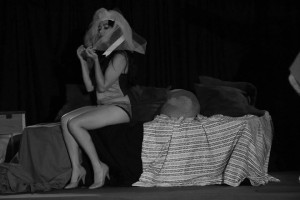The Opposite Of People (TOOP)’s production of “Love in the Garden,” directed and adapted from its original form by sophomore Alberto Carillo Casas, was performed from Nov. 6-9 in Drama House. The show was shrouded in reds, yellows, greens, and eroticism, and was surely the product of a whimsical imagination meant to create a world of pure theatrical entertainment. The original play, titled “The Love of Don Perlimpín and Belisa in the Garden,” was written by the Spanish playwright Federico García Lorca in 1928.
The floor in front of the stage was covered in colorful flowers, upon which the cast trod and played during the show. The stage itself consisted of a suspended curtain that could be drawn to conceal or show a makeshift bed. A reddish glow shone over the set, which, overall, did a good job reflecting the surrealism of the play. Upon entering, audience members were approached by cast member and senior Sam Whalen, who was a member of the chorus and acted multiple parts, eccentrically playing the ukulele and handing out spacey compliments with a dazed smile. Her face, like the faces of all cast members except seniors Brian Giacalone and Evelyn Hernandez, was painted white in a traditionally dramatic, clownlike way. Whalen also donned a red clown nose. Other cast members included Perlimpín’s nanny, Marcolfa; senior Devin Goodman; juniors Emma Guilfoyle and Angel Morales; and sophomore Mario Gambino.
The original play included only the story of Don Perlimpín and Belisa, a couple forced upon each other in accordance with the tradition of marriage and the temptation of sex. Carillo Casas chose to incorporate other works by Lorca in his adaptation, however, interrupting the plot of the original play with scenes from “The Shoemaker’s Prodigious Wife,” “The Girl Who Waters the Basil,” and the poem “Romance de la Luna, Luna.” This modification created an interesting and sometimes difficult-to-follow effect, first introducing Whalen as “the poet” figure, an oppressed artist on the road with an acting company, and then using other works as pauses to reflect on the progression of emotion in the main story. The first two interludes, telling the tale of a girly girl who waters basil and a shoemaker who does not want his daughter to be married, created a lighthearted and strange atmosphere. It was also enjoyable as a way to honor storytelling in Lorca’s era. Before the plot turned to Perlimpín’s story, however, the dark poem “Romance de la Luna. Luna” foreshadowed Perlimpín’s death.
This mish-mash of Lorca works was fun to watch, and the works themselves were well-performed, but the overall experience of the play left a bit to be desired in terms of understanding how they were all related. That being said, the experimentation of Carillo Casas honored Lorca to create a fanciful restoration comedy of the Renaissance era in the late 20th century.
While the original story of Perlimpín and Belisa was captivating, telling of a man who tricks his lustful wife into believing he is a secret seducer, the performances by the chorus members were the most entertaining. Whalen delivered the poem toward the end with a startling passion, jarring the audience with its suddenness that interrupted an otherwise comedic play. On a lighter note, chorus members Gambino, Guilfoyle, and Morales had spirit-lifting fun on stage, reminding the audience of a classical style of stage acting that allows for such effusiveness. One of the most entertaining parts was when the mischievous sprites (played by Morales and Guilfoyle) danced around the flowers, picking them up and interacting with the set, and stacked on top of each other while observing the happenings of the play within a play about Belisa. Guilfoyle and Gambino got some laughs in the girly-girl sequence, with Gambino feigning a hilarious Italian accent in his courtship of the girly girl, and Guilfoyle dressed in different wigs and dresses, turning the tables on her pursuer. These in-between moments were the most fun, allowing for the Midsummer-Night’s-Dream-esque world of sprites and laughable acting troupes.
Self-advertised as a “erotic farce,” “Love in the Garden” experimented with eroticism in slightly strange ways, one scene depicting Perlimpín nonchalantly receiving a blow job from his nanny, Marcolfa. Belisa’s costume was a low-cut red lingerie bodice and underwear. Hernandez’s character was also sexualized by her moving silhouette behind the curtains on stage and her siren song that talked of the temptations of flesh. The melodrama of Hernandez as Belisa and Giacalone as Perlimpín both did a good job of depicting the incompatibility of the two characters. Overall, the cast and crew effectively depicted a outlandish and colorful world of pleasure and drama, mischief and tragedy.
and Gambino got some laughs in the girly-girl sequence, with Gambino feigning a hilarious Italian accent in his courtship of the girly girl, and Guilfoyle dressed in different wigs and dresses, turning the tables on her pursuer. These in-between moments were the most fun, allowing for the Midsummer-Night’s-Dream-esque world of sprites and laughable acting troupes to take shape.
Self-advertised as a “erotic farce,” “Love in the Garden” experimented with eroticism in slightly strange ways, one scene depicting Perlimpín nonchalantly receiving a blow job from his nanny, Marcolfa. Belisa’s costume was a low-cut red lingerie bodice and panties. Hernandez’s character was also sexualized by her moving silhouette behind the curtains on stage and her siren song that talked of the temptations of the flesh. Both Hernandez as Belisa and Giacalone as Perlimpín both did a good job of depicting the incompatibility of the two characters. Overall, the cast and crew effectively depicted a outlandish and colorful world of pleasure and drama, mischief and tragedy.
TOOP’s next show. “Until the Sonder Falls”, runs Nov. 20-22 at 8pm at the Drama House, with a matinee show on the 22nd at 3pm.
McAdams is a member of the class of 2017.




